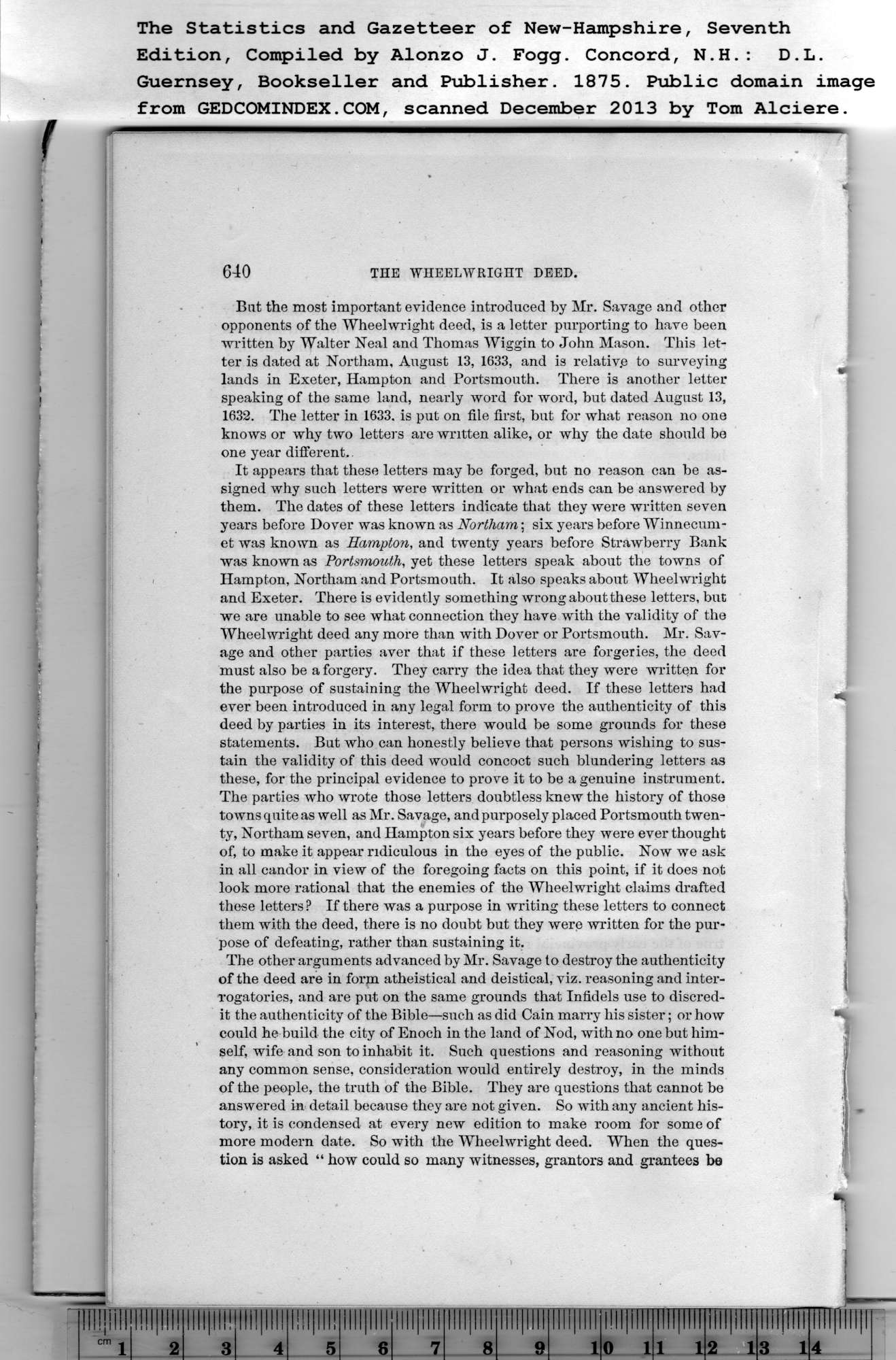|
640 THE WHEELWRIGHT DEED.
But the most important evidence introduced by Mr. Savage and other
opponents of the Wheelwright deed, is a letter purporting to have been
written by Walter Neal and Thomas Wiggin to John Mason. This let-
ter is dated at Northam, August 13, 1633, and is relativ.e to surveying
lands in Exeter, Hampton and Portsmouth. There is another letter
speaking of the same land, nearly word for word, but dated August 13,
1632. The letter in 1633. is put on file first, but for what reason no one
knows or why two letters are written alike, or why the date should be
one year different,.
It appears that these letters may be forged, but no reason can be as-
signed why such letters were written or what ends can be answered by
them. The dates of these letters indicate that they were written seven
years before Dover was known as Northam; six years before Winnecum-
et was known as Hampton, and twenty years before Strawberry Bank
was known as Portsmouth, yet these letters speak about the towns of
Hampton, Northam and Portsmouth. It also speaks about Wheelwright
and Exeter. There is evidently something wrong about these letters, but
we are unable to see what connection they have with the validity of the
Wheelwright deed any more than with Dover or Portsmouth. Mr. Sav-
age and other parties aver that if these letters are forgeries, the deed
must also be a forgery. They carry the idea that they were written for
the purpose of sustaining the Wheelwright deed. If these letters had
ever been introduced in any legal form to prove the authenticity of this
deed by parties in its interest, there would be some grounds for these
statements. But who can honestly believe that persons wishing to sus-
tain the validity of this deed would concoct such blundering letters as
these, for the principal evidence to prove it to be a genuine instrument.
The parties who wrote those letters doubtless knew the history of those
towns quite as well as Mr. Savage, and purposely placed Poi'tsmouth twen-
ty, Northam seven, and Hampton six years before they were ever thought
of, to make it appear ridiculous in the eyes of the public. Now we ask
in all candor in view of the foregoing facts on this point, if it does not
look more rational that the enemies of the Wheelwright claims drafted
these letters ? If there was a purpose in writing these letters to connect
them with the deed, there is no doubt but they were written for the pur-
pose of defeating, rather than sustaining it.
The other arguments advanced by Mr. Savage to destroy the authenticity
of the deed are in form atheistical and deistical, viz. reasoning and inter-
rogatories, and are put on the same grounds that Infidels use to discred-
it the authenticity of the Bible—such as did Cain marry his sister; or how
could he build the city of Enoch in the land of Nod, with no one but him-
self, wife and son to inhabit it. Such questions and reasoning without
any common sense, consideration would entirely destroy, in the minds
of the people, the truth of the Bible. They are questions that cannot be
answered in detail because they are not given. So with any ancient his-
tory, it is condensed at every new edition to make room for some of
more modern date. So with the Wheelwright deed. When the ques-
tion is asked “ how could so many witnesses, grantors and grantees be
PREVIOUS PAGE ... NEXT PAGE
This page was written in HTML using a program written in Python 3.2
|
